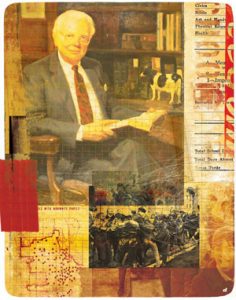 A previous blog post discussed a pair of stories in the Summer 2019 Marquette Lawyer magazine and concluded by quoting one of them: specifically, an observation by Professor David Strauss of the University of Chicago, based on the Boden Lecture at Marquette Law School by Duke’s Professor Ernest Young, that “in the end, there is only so much the law can do to save a society from its own moral failings.” This post takes up a second pair of stories in the magazine, from which one might draw the same conclusion.
A previous blog post discussed a pair of stories in the Summer 2019 Marquette Lawyer magazine and concluded by quoting one of them: specifically, an observation by Professor David Strauss of the University of Chicago, based on the Boden Lecture at Marquette Law School by Duke’s Professor Ernest Young, that “in the end, there is only so much the law can do to save a society from its own moral failings.” This post takes up a second pair of stories in the magazine, from which one might draw the same conclusion.
While it remains a fact about the large majority of schools in the Milwaukee area now, segregation of Milwaukee school students by race was the subject of great energy—attention, advocacy, and controversy—in the 1960s and 1970s. Two pieces in this summer’s Marquette Lawyer focus on the Milwaukee education scene of that earlier era.
In one, Alan Borsuk, the Law School’s senior fellow in law and public policy, writes about the decision issued in January 1976, by U.S. District Judge John W. Reynolds, which ordered that the Milwaukee Public Schools be desegregated. “A Simple Order, a Complex Legacy” touches upon the legal history of school desegregation cases, Reynolds’ 1976 ruling itself, and the legacy of that Milwaukee ruling. To borrow a phrase from Professor Young’s Boden Lecture, there is scarcely “an optimistic, onward-and-upward feel” to the account.
In the second piece, Mike Gousha, the Law School’s distinguished fellow in law and public policy, approaches the same general era, primarily through the eyes of his father, Dr. Richard P. Gousha, who was superintendent of Milwaukee Public Schools from 1967 to 1974. Richard Gousha, who lives now in California, saved the texts of speeches he gave as superintendent, and Mike Gousha uses excerpts from his father’s remarks to paint a rich and evocative picture of MPS in the years leading up to the 1976 federal court decision. As the title suggests, the matters in “A Father’s Timeless Words from a Turbulent Time” are of more than historical interest. Mike Gousha explains, “I was struck by how issues facing MPS in the late 1960s and early 1970s still confront the district today.”
The continuing importance of the topics and themes of these two articles has been reflected in the national public conversation even since their publication. In particular, consider the recent debate between Democratic presidential candidates, former Vice President Joe Biden and Senator Kamala Harris, engaging with one another about the appropriate role of busing in desegregating public schools. “We don’t want another Boston” may have been a mantra of Milwaukee’s leaders in 1976, as Borsuk relates in reference to the busing-related controversy and even violence in that East Coast city of that general era. Yet he also notes of Milwaukee that, for part of the legacy of Reynolds’s ruling, “busing became so widespread that some have wondered whether there is another city in the country where the presumption is weaker that children will attend their neighborhood school.”
The pieces are well worth reading: The article on the Reynolds’ decision may be read by clicking here, and the Gousha article may be read by clicking here.
